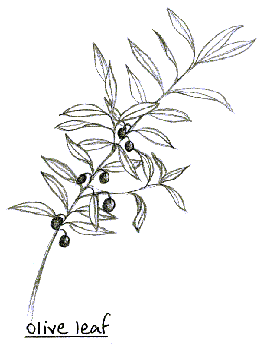 |

OLIVE LEAF: NATURE'S ANTIVIRAL
Olive leaf extract
is a powerful antiviral and antibacterial agent, and it is also
the first botanical mentioned in the Bible: "And the dove came in
to him in the evening, and lo, in her mouth was an olive leaf plucked
off. So Noah knew that the waters were abated from off the earth."
(Genesis 8:11 King James Bible.)
A few thousand
years later, in Ezekiel 47:12, God speaks of a tree: "The fruit
thereof shall be for meat, and the leaf thereof for medicine." Then,
in Revelations, at the very end of the New Testament, there is an
angelic vision of a "tree of life" whose leaves "were for the healing
of the nations."
In 1854, the
Pharmaceutical Journal carried a report by Daniel Hanbury, wherein
he said he had discovered olive leaf was an effective tincture and
that he had used it successfully in treating his patients in Britain.
Dr. Hanbury believed that a bitter substance in the leaves was the
key healing ingredient, and he was right. (56)
Many years later,
scientists isolated a bitter substance in the olive leaf and named
it oleuropein. This chemical is what makes the olive tree resistant
to insect and bacterial damage. Oleuropein is removed from olives
when they are cured, so eating olives alone is not going to supply
you with this remarkably curative substance.
In 1962, about
100 years later, an Italian researcher reported that ingesting oleuropein
lowered blood pressure. Other European researchers confirmed this.
They also discovered that olive leaf extract could increase blood
flow in coronary arteries, relieve arrhythmias, and prevent intestinal
muscle spasms, an important element in treating hepatitis C victims.
A Dutch researcher
further determined that the active ingredient in oleuropein is a
substance called elenolic acid. In the late 1960s, when drug experimentation
was at its best, scientists at Upjohn, a major American pharmaceutical
company, demonstrated that elenolic acid inhibited the growth of
viruses. In fact, it stopped every virus that it was tested against.
Medical researcher
Morton Walker, D.P.M., wrote about olive leaf extract in the July
1996 issue of the Townsend Letter for Doctors and Patients: "the
intake of flavonoids is correlated with a lower incidence of cardiovascular
disease indicating that the daily intake of olive oil and/or olive
leaf extract containing phenols will likely bring on a similar result."
(57)

According to
James R. Privitera, M.D., some of the unique properties of olive
leaf are as follows:
| ·
An ability to interfere with critical amino acid production
essential for the survival of viruses; |
| ·
An ability to contain viral infection and/or spread of it by
inactivating the viruses or by preventing virus shedding, budding,
or assembly at the cell membrane; |
| ·
The ability to directly penetrate infected cells and stop viral
replication; |
| ·
In the case of retroviruses, olive leaf extract is able to neutralize
the production of transcriptase (a protease), which is essential
for enabling retroviruses such as HIV to alter the RNA of a
healthy cell; and |
| ·
It can stimulate phagocytosis, an immune system response in
which cells ingest harmful microorganisms and foreign matter
(such as bacteria and viruses.) (58) |
Olive leaf extract
has been shown to be effective against herpes, flu and colds, bacterial
infections, diabetes, rheumatoid arthritis, chronic fatigue syndrome,
allergies, vaginal yeast infections, skin conditions, malaria, hepatitis
B and hepatitis C.
Considering
the serious side effects and shortcomings of pharmaceutical drugs,
it would be wise to at least try olive leaf for these problems prior
to exposing ones' self to chemical synthetics.
During my
treatment I took:
One 500 mg. of olive leaf extract capsule three days a week.
|

